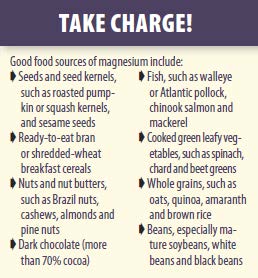Getting enough magnesium in your diet from foods such as whole grains, nuts, fish and vegetables may reduce your risk of diabetes. Adequate magnesium may be especially important for those at greatest risk of progression to diabetes.

A new Tufts study led by Adela Hruby, PhD, reports that initially healthy people with the highest magnesium intake were 37% less likely to develop metabolic impairment, such as high blood sugar levels or excess circulating insulin. Those already diagnosed with metabolic impairment who consumed the most magnesium were 32% less likely to develop diabetes than those consuming the least.
Magnesium is the forgotten mineral, says Nicola M. McKeown, PhD, an associate professor at Tufts Friedman School and corresponding author on the study, published in Diabetes Care. Only 50% of Americans achieve the recommended dietary allowance for magnesium, which is 400-420 milligrams per day for adult men and 310-320 milligrams per day for adult women.
SEVEN YEARS OF DATA:Previous observational studies have shown that people with higher magnesium intake are 10%-47% less likely to develop type 2 diabetes, and clinical trials have linked magnesium to improved glucose and insulin metabolism. The new study sought to confirm these associations among 2,582 participants in the long-running Framingham Heart Study Offspring cohort, average age 54.

Participants were followed for seven years, during which they were given standard medical exams and completed diet questionnaires. Hruby and colleagues grouped participants into five categories based on magnesium intake calculated from their diets. Overall, those with the highest intake had just half the risk of developing diabetes of those with the lowest magnesium consumption.
FACTORING OUT FIBER: Since magnesium is found in foods high in other healthy nutrients, such as potassium, fiber and antioxidants, its possible that dietary factors besides magnesium are responsible for the observed benefit. But researchers sought to account for this by adjusting for dietary fiber, found in whole grains and vegetables.
This allows us to at least partially distinguish the association of magnesium from the association of the food themselves, their constituents, or health behaviors associated with these foods, Hruby explains. For example, high fiber intake may also be a surrogate marker of a healthy lifestyle.
Adjusting for dietary fiber did weaken the association in the initially healthy population, but did not substantially affect results among those already metabolically impaired. Therefore, according to Hruby, Magnesium intake may be particularly beneficial in offsetting risk of developing diabetes among those at high risk.
























